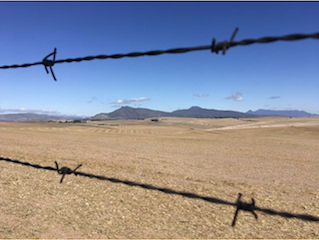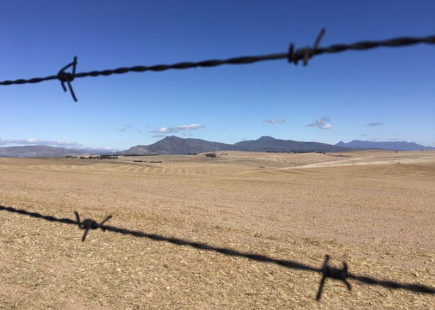Ideas into movement
Boost TNI's work
50 years. Hundreds of social struggles. Countless ideas turned into movement.
Support us as we celebrate our 50th anniversary in 2024.

What is the transformative potential that emerges from these struggles around land?


Flickr/Michael Mayer. Some rights reserved.
Just a month ago, Jacob Zuma was president of South Africa. An authoritarian patriarch implicated in large-scale corruption, he had for years effectively rallied political support by invoking populist discourses around land reform and radical economic transformation.
Zuma’s shallow radical rhetoric sat astride disdain for the interests of ordinary rural dwellers, consistent defence of corporate and private property rights, and the perpetuation of the longstanding division between wealthy commercial farming areas and communal areas under forms of state-sanctioned traditional authority.
Now Zuma is gone, but has an era of authoritarian populism given way to a much-sought freedom? Is a new emancipatory politics afoot?
These were the questions animating a lively debate among activists and researchers from across the Southern African region who met recently to prepare for a global convening of the Emancipatory Rural Politics Initiative. ERPI is a global network of activist-scholars committed to understanding and generating alternatives to such regressive and authoritarian politics.
Our meeting focused on several key issues: unaccountable and authoritarian chiefs; corrupt mining deals that dispossess the poor; farm dwellers excluded from land rights; food sovereignty and alternatives to industrial agriculture.
But the heart of the challenge for rural people in the region remains undemocratic and authoritarian forms of governance, and this is where current activism and research is focusing.
In rural South Africa, the space of populism is dominated by traditional leaders who, under Zuma’s rule, became more powerful and authoritarian. This was underpinned by efforts to shore up traditional leaders – kings, chiefs and headmen – in a bid to secure rural electoral support.
In the name of ‘custom’, rural leaders have usurped the land rights of communities, entering into corrupt business deals. Most such deals centre on the ‘platinum belt’ in the north-west of South Africa, where an estimated 90 percent of the world’s platinum reserves sit under communal land, and where poor black people continue to have insecure rights. It’s a perfect storm. The stakes are high. Hundreds of billions of South African Rands in mining royalties have disappeared into chiefs’ accounts, never to be seen by the rural people who have been displaced to make way for mining operations.
Rural conflicts centre on the explosive contradiction between local people’s land rights and livelihoods, on the one hand, and the interests of transnationalised mining companies on the other.
Rural conflicts centre on the explosive contradiction between local people’s land rights and livelihoods, on the one hand, and the interests of transnationalised mining companies on the other. All this has set up toxic and often intractable conflicts between government, companies and traditional leaders against rural people.
Constance Mogale of the Alliance for Rural Democracy (ARD) – a social movement linking people living in areas held under customary tenure – explains: ‘There has been a betrayal of the promise of democratic governance and land rights for the people. Instead of free, prior and informed consent, [investing] companies are consulting individual men, often self-appointed, rather than engaging customary land-rights holders.’
Most recently, a furore has exploded across the country, in which Zulu king Goodwill Zwelethini has threatened civil war if his control of 2.8 million hectares were to be threatened. This was in response to calls to rein him in, after evidence emerged that he has, through his Ingonyama Trust which owns this once-communal land, started to convert rural dwellers’ rights into leasehold, making people pay rent to remain on their own land.
He has issued a call to all Zulus to contribute to a legal fund with which to challenge any attempt to hold him to account. As with other forms of authoritarian populism, we can see here all the typical hallmarks: resource capture, elite interests, and a discourse that ‘enlists the poor merely as a battering ram’ in battles among elites, as Ben Cousins of the University of the Western Cape says.
Instead of rejecting custom, movements like ARD are mobilising an emancipatory politics to contest the character of custom and to democratise it. Rather than abandoning customary tenure and practices, the challenge for rural movements is to seize on their emancipatory potential – a point made by Mahmood Mamdani in his key work, Citizen and Subject. Despite attempts by both the apartheid and democratic governments over decades to impose authoritarian forms of custom, ordinary rural people intuitively grasp notions of participatory democracy.
Ordinary rural people intuitively grasp notions of participatory democracy.
Custom can be a basis for emancipatory visions. The Nguni saying that summarises traditional social relations is ‘Umuntu ngumuntungabantu’ which means ‘a person is a person through other people’. Instead of posing custom and human rights in opposition to one another, a reclaiming and democratization of custom can be a powerful step in building emancipatory politics from below.
Such a politics is emerging in some places. In a paper for the ERPI conference, Zenande Booi, Mazibuko Jara and Vukile Macingwana of the rural movement Ntinga Ntaba kaNdoda, show how rural people have been fighting against imposed and despotic traditional leaders, who claim that community land is their own.
And in the case of the Premier of the Eastern Cape and Others v Ntamo and Others, the community of Cala Reserve in the Eastern Cape rejected a state-imposed headman (a local chief) and insisted that its ‘custom’ has been to elect its own headman, a practice that it could demonstrate stretched back to the 1880s. In other words, the community’s own definition of custom, which was democratic, should take precedence over a state-imposed version. The community won the case and the right to this democratic practice, unravelling a core form of authoritarian rule in rural areas, in which chiefs have been accountable upwards to the state rather than downwards to citizens.
In the commercial farmlands, in contrast, among labour tenants and farm dwellers, there is little collective resistance or challenge to the hegemony of white landowners. Rather, what is evident is everyday resistance in a context of very violent structural and relational power.
What is evident is everyday resistance in a context of very violent structural and relational power.
This is evident on the country’s eastern seaboard, where a historical practice of ‘labour tenancy’ saw large numbers of black tenant farmers retaining access to land by providing labour to white farmers. In another paper for the ERPI conference, Stha Yeni and Donna Hornby show how this population of rural dwellers identifies as ‘farmers’ but are unable to benefit from small-scale farmer support, as they are living on privately-owned land. They reject the imposition of private property rights around them, saying ‘We were here and the farms found us here. The boundaries were superimposed on us.’
An enduring tension has emerged between people whose claims to land are based on holding title deeds versus those whose claims are based on a history of occupation and use and the provision of free labour over generations. And of course, being South Africa, the owners are white and the tenant farmers are black.
In such contexts, the call by the radical opposition party, the Economic Freedom Fighters (EFF), for expropriation of land without compensation is resonating with people. It is a call that, with the support of the ruling African National Congress, led to a resolution in Parliament in February 2018 to investigate whether a constitutional amendment should be considered – this despite the ANC’s failure to respond to labour tenants’ existing land claims or to expropriate within the bounds of existing constitutional provisions.
Threatened by the rise of populist sentiment, the ruling party has taken to blaming the Constitution for its own political failures. This has sparked, not surprisingly, triumphalism among EFF supporters and racist hysteria by the white right, with global headlines warning of ‘another Zimbabwe’ and banks scurrying to work out how they will deal with their exposure of an estimated R160 billion in farmland debt.
Where does this leave South Africa, reeling as it is in the aftermath of Jacob Zuma’s traditionalist kleptocracy, economic recession and rising populism?
We have a constrained new President, Cyril Ramaphosa, who has been handed a mandate to expropriate land without compensation while simultaneously confronting the corrupt chieftaincy and its land dealings that have sold out their own people. As Richard Poplak, recently observed:
On the land question, the president will require a measure of aggression against the old forces of capital, who are already waving around hundreds of billions-worth of farmer bonds like a loaded gun, to say nothing of industrial-strength crooks like the Zulu King Zwelithini, who is dog-whistling all manner of threats should “his” land be transferred over to the people who live on it.
Most current agrarian struggles are reactionary and protective, pitted against the incursions of commodification and commercialization, rather than visionary of an alternative set of rights and practices. But what is the transformative potential that emerges from these struggles? What are the alternative visions?
These are the questions that rural people, their social movements and allies in non-governmental organisations and academia are grappling with. Should there be subdivision of big landed estates? What about farm workers and their jobs? What will happen to production? And how can food security and food sovereignty be achieved?
As Dinga Sikwebu of the Tshisamani School of Activism argues, emancipatory politics means building the momentum, and sometimes the anger, that is needed to create alternatives and imagine a different future. Our visions for the future need to be pre-figured; even in the midst of change, we need to start to create alternative futures.
A person is a person through other people.
Because building a new politics and a new society means uncertainty, we need to embrace humility central to a radical politics, meaning that we don’t always know the answers and must mistrust dogma and instruction from above.
Emancipatory politics in rural South Africa is under-developed and rural struggles are largely defensive. But out of the old, there are embryonic forms of agrarian alternatives and emancipatory politics – of land redistribution, food sovereignty, participatory democracy and accountable rural governance – that are taking root.